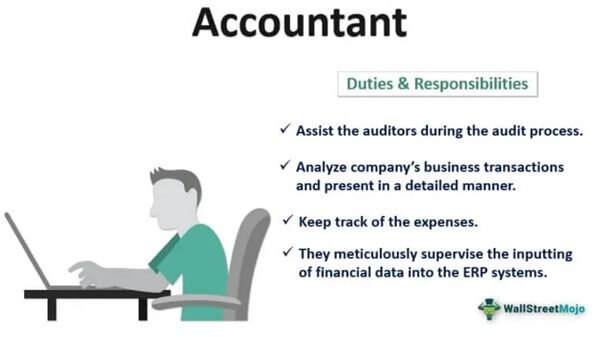The Essential Duties of an Accountant
Duty 1: Financial Recording and Reporting
Accountants play a crucial role in maintaining accurate financial records and generating essential reports for businesses and organizations. This duty encompasses a range of tasks that are fundamental to the financial health and decision-making processes of any entity. What are 3 duties of an accountant?
1.1 Bookkeeping
At the core of an accountant’s responsibilities is bookkeeping. This involves recording all financial transactions, such as sales, purchases, expenses, and payments, in an organized and systematic manner. Accurate bookkeeping provides the foundation for generating financial statements and reports that give insight into a company’s financial performance.
Bookkeepers use accounting software and tools to document every financial event, ensuring that all transactions are properly categorized and reconciled. This meticulous attention to detail is essential for creating a clear and accurate financial picture of an organization’s operations.
1.2 Financial Reporting
Generating timely and accurate financial reports is another crucial duty of accountants. These reports include balance sheets, income statements, and cash flow statements. These documents provide a comprehensive overview of an organization’s financial position, profitability, and liquidity.

What are 3 duties of an accountant?
Accountants analyze the data in these reports to identify trends, patterns, and areas of concern. These insights help business owners, managers, and stakeholders make informed decisions about resource allocation, investment opportunities, and strategic planning.
Duty 2: Tax Planning and Compliance
Taxation is a complex and ever-changing landscape that requires expertise and diligence to navigate effectively. Accountants play a vital role in ensuring that businesses meet their tax obligations while optimizing their tax strategies.
2.1 Tax Planning
One of the key duties of an accountant is to develop effective tax strategies that minimize a company’s tax liability while remaining compliant with relevant laws and regulations. Accountants analyze a business’s financial data to identify opportunities for tax deductions, credits, and exemptions. By understanding the intricacies of tax codes and regulations, accountants help businesses make strategic financial decisions that can lead to significant tax savings.
2.2 Tax Compliance
Staying compliant with tax laws is essential to avoid legal issues and penalties. Accountants ensure that businesses accurately calculate and report their taxes, including income tax, payroll tax, sales tax, and more. They prepare and file tax returns on behalf of the organization, taking care to meet all deadlines and provide complete and accurate information. What are 3 duties of an accountant?
Accountants also keep abreast of changes in tax regulations, helping businesses adapt their practices to remain compliant and take advantage of any new opportunities for savings.
Duty 3: Financial Analysis and Consultation
Beyond recording financial transactions and managing taxes, accountants provide valuable insights through financial analysis and consultation. This duty involves interpreting financial data to inform strategic decision-making and help organizations achieve their financial goals.

3.1 Financial Analysis
Accountants analyze financial statements and reports to assess an organization’s financial performance and health. They identify areas of strength and weakness, uncover trends, and highlight opportunities for improvement. By evaluating key performance indicators (KPIs), accountants help businesses make informed decisions that drive growth and profitability.
3.2 Financial Consultation
Accountants serve as trusted advisors, offering expert guidance on financial matters. They work closely with business owners and management teams to provide insights into budgeting, investment decisions, and long-term financial planning. Accountants may provide scenario analysis, helping organizations understand the potential impact of different financial strategies.
In addition, accountants often collaborate with other professionals, such as financial analysts and investment advisors, to provide a comprehensive view of an organization’s financial landscape.
Conclusion
Accountants fulfill a range of critical duties that contribute to the success and stability of businesses and organizations. From maintaining accurate financial records to navigating complex tax regulations and providing strategic financial insights, accountants play an indispensable role in shaping sound financial decisions. Their expertise and dedication ensure that businesses can effectively manage their finances, achieve their goals, and thrive in a competitive marketplace. For a financial accountant ashfield see here.

